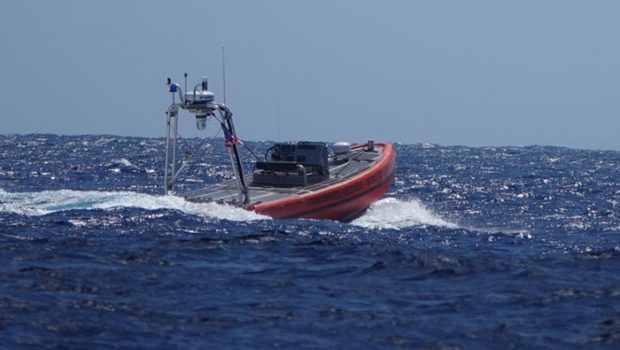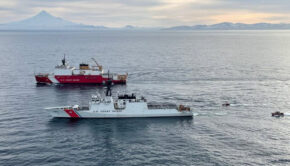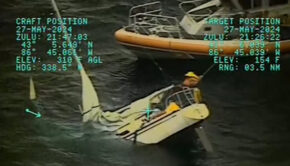Coast Guard tests unmanned surface vehicles
Published on November 28th, 2020
The U.S. Coast Guard completed a 30 day demonstration and evaluation in early November of unmanned surface vehicles (USVs) off Oahu, Hawaii.
The focus of the test was to explore how current and emerging technologies might be used to enhance maritime domain awareness in remote regions. The test also showed ways USVs with assorted sensor capabilities might support the Coast Guard’s many missions around the globe ranging from search and rescue, to law enforcement.
“It’s clear that autonomous technology is a growing industry, and has great potential to enhance Coast Guard operations,” said Cmdr. Blair Sweigart, the demonstration’s director from the Coast Guard Research and Development Center. “Combined with artificial intelligence algorithms, unmanned systems could be a game changer.”
During the test the Coast Guard examined USVs from Saildrone and Spatial Integrated Systems to understand their capabilities and effectiveness. The USVs participated in a variety of operational simulations to detect and alert the Coast Guard to both legitimate and nefarious behavior.
As outlined in the Coast Guard’s Strategic Plan 2018-2022, one of the service’s main goals is to “evaluate emerging technologies, such as unmanned platforms, artificial intelligence, machine learning, network protocols, information storage, and human-machine collaboration for possible use in mission execution.”
These tests represent a commitment to those goals, allowing the Coast Guard to identify how USVs could be used to support search and rescue operations, improve Marine Environmental response, enhance Port Security, aid in the fight against illegal maritime smuggling, and identify vessels engaged in illegal, unreported, and unregulated fishing.
“The demonstration helped us understand what these technologies currently are, and are not, capable of,” said Sweigart. “These vessels proved to be very effective across a variety of mission areas. The results of this study will help shape how the Coast Guard, and our partners, incorporate USVs into our future operations.”
With their long endurance, USVs can provide persistent domain awareness in remote regions of the U.S. Exclusive Economic Zone. By conducting the demonstrations off Hawaii, the teams gained a firsthand understanding of how these assets could help protect the islands, and the critical resources and habitats throughout Oceania.
Many of the Coast Guard’s missions require close coordination with federal, state, local, and international partners and during the tests the Coast Guard worked closely with NOAA, DHS partners, the Navy, and agencies from several partner nations who face similar issues to protect the global maritime and fishing industries.
Source: USCG











 We’ll keep your information safe.
We’ll keep your information safe.